The Sixth International Conference on Psycholinguistics in China, hosted by the Chinese Association of Psycholinguistics (CAP), Association for Comparative Studies of English and Chinese, and sponsored by the School of International Studies, ZJU, was held from June 10th to 12th, 2022.
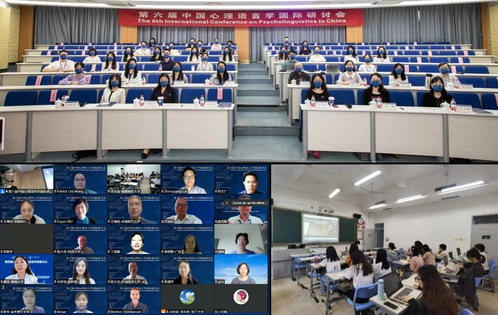
The main venue, the online venue, and a parallel session
The Conference was attended by about 280 guests and speakers from over 90 institutions of higher learning worldwide, including Cornell University, The Chinese University of Hong Kong (CUHK), The Hong Kong Polytechnic University, University of Macau, Tsinghua University, Peking University, Zhejiang University, Fudan University, Renmin University of China, Beijing Foreign Studies University, Xi’an International Studies University, Guangdong University of Foreign Studies. After an expert review, the Conference accepted 252 articles out of all the 313 submissions on the different fields of psycholinguistics.
Divided into sections of presession workshops, keynote speeches, interdisciplinary symposia, theme fora, and group reports, the Conference, overcoming the inconveniences caused by the pandemic, extended its venues through the Internet to reach and connect the audience both at home and abroad. It attracted more than 12,000 viewers online, in addition to about 40 students and teachers from Zhejiang University as attendees onsite.
As a prelude to the Conference, the presession workshop on the afternoon of June 10th was chaired by Prof. Li Guangze from Fujian Normal University. Prof. Cai Zhenguang from CUHK, with Max Dunn and Duan Xufeng, two of is doctoral mentees, presented their experiment design and programming methods for online data collection in carrying out empirical psycholinguistic studies in the post-pandemic era, and showed the process to build classical experimental paradigms with Qualtric and Gorilla.
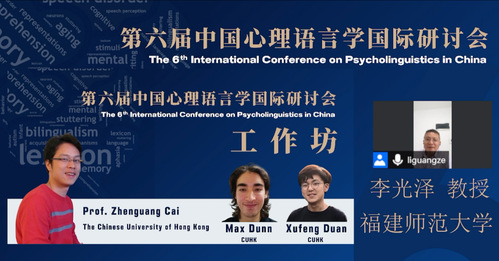
Live streaming of the presession workshop
At 8:30 am on June 11th, the Conference was inaugurated at Hall 223, Meng Minwei Building on Zijingang Campus, Zhejiang University, where Prof. He Lianzhen, Vice President of Zhejiang University, and Prof. Dong Yanping, Chair of CAP delivered their opening speeches, with Prof. Liang Junying from Zhejiang University hosting the ceremony.

Prof. He Lianzhen and Prof. Dong Yanping delivered opening speeches
Prof. He extended her warm welcome to global attendees at the beginning of her speech, before introducing the status quo of the School of International Studies at ZJU, and its first-tier discipline of Foreign Languages and Literature. She was assured that the Conference would be an effective platform where students and teachers could fully exchange ideas and cooperate in the future, to jointly promote psycholinguistic studies in Chinese to a world-class level. On behalf of the CAP, Prof. Dong welcomed all attendees both onsite and online, and expressed her wish to witness some remarkable progress made by the Chinese academia of psycholinguistic in recent years.
On the mornings of 11th and 12th, five keynote speeches were given respectively by Prof. Morten H. Christiansen from Cornell University, Prof. Patrick C. M. Wong from the Chinese University of Hong Kong, Prof. Wang Suiping from South China Normal University, Prof. Lu Chunming from Beijing Normal University, and Prof. Zhang Qingfang from Renmin University of China, each presenting an inspiring and insightful exploration on some hot topic and frontier in psycholinguistics.
Prof. Morten H. Christiansen took the lead with the speech on “The Language Game: How Improvisation Created Language and Changed the World,” with Prof. Wu Fuyun from Shanghai Jiao Tong University hosting. After all the studies, it was Prof. Morten’s conviction that language is comparable to a riddle, and languages are spontaneously structured throughout generations of cultural evolution rather than an inherent “instinct”. In addition, languages keep optimizing themselves, and exert profound impact on human evolution by generating complex civilizations.
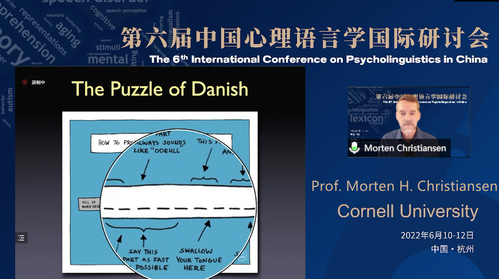
Prof. Morten H. Christiansen from Cornell University delivered his keynote speech
The second keynote speech “Predicting Individual Differences in Language Learning Across Populations” was hosted by Prof. Cai Zhenguang and delivered by Prof. Patrick C. M. Wong from the Chinese University of Hong Kong.Prof. Patrickintroduced the neural mechanisms of second language acquisition among adults as well as that of native language learning among children, and reported on several recent studies by his team in constructing individual predictive models of children through biological measurements. These studies would provide scientific basis for different types of early interventions in optimizing individual language development.
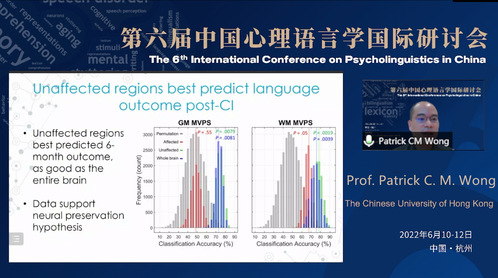
Prof. Patrick C. M. Wong from the Chinese University of Hong Kong delivered his keynote speech
Prof. Wang Suiping followed with her speech on “The Prediction Processing in Language Comprehension” with the host of Prof. He Wenguang from Qufu Normal University. With reference to the poly-intonational cue in Chinese “yi,” she explored the phonological prediction in language comprehension and processing. It was found that violations against intonational prediction can have immediate effects; in speech processing, phonological (intonation) information can be drawn upon to predict the oncoming message; some brain areas are shared for the purposes of prediction, detection of violated prediction, and language production.
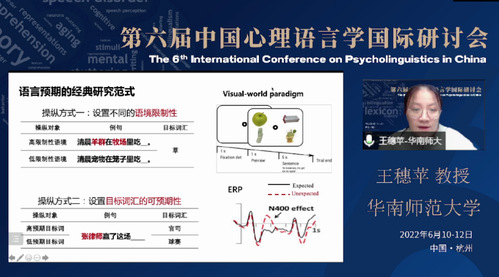
Prof. Wang Suiping from South China Normal University delivered her keynote speech
The fourth keynote speech entitled “The Cognitive Neural Mechanisms of Verbal Communication”, was hosted by Prof. Ji Yinglin from Shenzhen University and delivered by Prof. Lu Chunming from Beijing Normal University. In the speech, Prof. Lu proposed a cognitive neural hierarchical model of interpersonal verbal communication, which emphasized that interpersonal verbal communication involves three levels of cognitive processes, two modes of processing, and a pattern of interbrain synchronization, and suggested an emotional moderating role played by the hierarchical structure of verbal communication, and that different types of social relationships might have preference for different types of communication modalities.
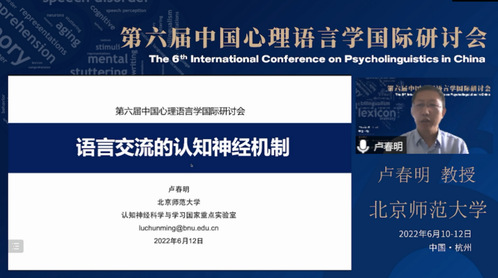
Prof. Lu Chunming from Beijing Normal University delivered his keynote speech
In the last keynote speech hosted by Prof. Qu Qingqing from Chinese Academy of Sciences, Prof. Zhang Qingfang presented her studies on “Cognitive and Neural Mechanisms of Ageing in Producing Chinese Spoken Vocabulary.” Her team found that the elderly face a decline in their ability to extract phonological information while producing vocabulary, and an aging in associating meaning and sound. Based on that, she proposed that future studies should draw upon EEG and functional MRI data to explore the cognitive implications of aging of neural patterns, and to scale the cognitive aging mechanism in the process of sentence production.
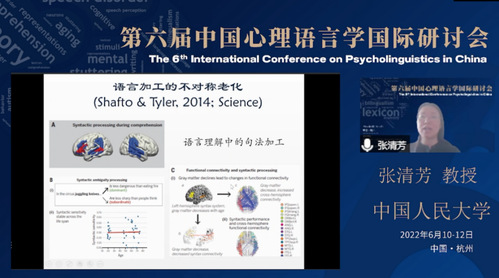
Prof. Zhang Qingfang from Renmin University of China delivered her keynote speech
The interdisciplinary symposia, hosted by Prof. Yang Jing of Zhejiang University, were given by Prof. Liu Haitao, Prof. He Lianzhen, and Prof. Dong Yanping of Zhejiang University. Starting with “Language Proficiency Development,” the three professors, from the perspective of quantitative linguistics, language testing, and psycholinguistics respectively, provided abundant examples to reveal how interdisciplinary studies would help develop language proficiency. Their speeches explored the opportunities and prospects of interdisciplinary research in the new era.

Interdisciplinary symposia
Professor Liu presented “A Quantitative Perspective on Language Proficiency Development: Dependency Distance & Dependency Direction”, in which he showed how to apply dependency distance to syntactic analysis. By pointing out that linguistics in the 21st century should pay attention to the diversity and variability of language-as-text, he emphasized the importance of basing our understanding of the nature of language systems on data so as to reveal language structures and new evolving patterns.
Professor He gave a speech entitled “An Assessment Perspective on Language Proficiency Development: A Case Study of Chinese Students’ English Listening Proficiency.” She introduced the theoretical basis, main contents and importance of the Chinese Standards of English, and then compared it to a locomotive for researchers who seeks to achieve full standardization and the same measurement in the learning, teaching, and assessing of English.
Prof Dong delivered her speech under the title “Psychological Mechanisms in Language Proficiency Development: An Case Study of Interpretation Proficiency Development.” Starting with an introduction to the psychological mechanism of interpretation proficiency development, she pointed out the two fundamental issues determining interpretation proficiency development: language control and processing control. Based on a series of studies, she proposed that interpretation proficiency is a multi-component adaptive system in which all sub-capabilities within coordinate and cooperate to accomplish various processing demands in interpretation.
Their speeches sparked a lively discussion among the audience online and onsite, in which relevant questions were raised and resolved. In answering the questions, the three professors highlighted that different disciplinesare complementary and mutually reinforcingalthough they hold different concerns and research methods, which serves the original purpose of interdisciplinary studies and setting up the symposia.

Discussion in interdisciplinary symposia
From 2:00 to 4:00 pm, June 11th, seven theme fora were held on parallel online venues, where young scholars of psycholinguistics delivered speeches to about 400 attendees in diversified themes, e.g., cognitive neural mechanisms of speech output, language and cognitive control, cognitive neural mechanisms of translation, cognitive mechanisms of syntax processing, action-related embodied effects, phonological perception and output, and cognitive processing and language acquisition.
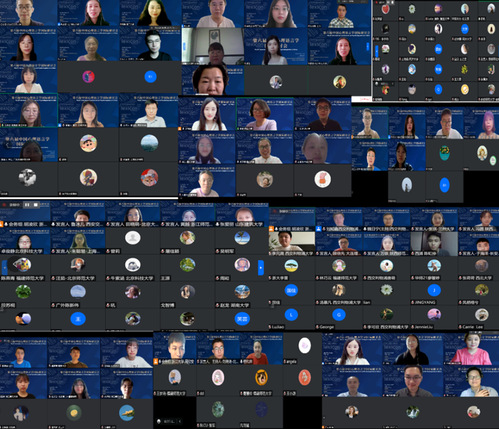
Some attendees at the theme fora and group reports
A total of 36 online group reports, held from 4:00 to 6:00 pm, June 11th, and from 8:30 to 10:30 am, June 12th, attracted nearly 700 attendees. The topics include embodiment effect, cognitive mechanisms of metaphor, language disorders in autistic children, phonological learning of Chinese as a second language, cognitive mechanisms of translation, linguistic research on the elderly, individual differences in second language acquisition, ontological processing of Chinese, cross-linguistic priming, phonological processing research, foreign language learning ability and influencing factors, contextual impact on language learning and processing, brain mechanisms of Chinese vocabulary processing, cognitive neural mechanisms of bilingual vocabulary processing, cognitive neural mechanisms of bilingual lexical processing, language output studies, learning with new technologies, language transfer, syntactic priming, cognitive neural mechanisms of metaphor, dyslexia in Chinese children, language testing studies, linguistic studies of teachers and pedagogies, perceptual processing of emotional words, studies of Chinese as a second language, bilingual control, second language syntactic processing, studies of second language phonological acquisition, second language acquisition, psychology paradigm language research, Chinese sentence processing, discourse and syntax processing, second language acquisition and vocabulary learning, language and sociocultural cognition, cross-cultural comparisons, diagnostic and intervention studies of language disorders, language and cognitive computing research.
The conference rounded off at 11:50 am, June 12th, with Prof. Hu Jiehui, General Secretary of the CAP, hosting the closing ceremony.
In his speech, Prof. Yan Guoli, Deputy Director of the CAP, announced the resolution that the Seventh International Conference on Psycholinguistics in China would be sponsored by School of Foreign Languages, Dalian University of Technology. Prof. Chen Hongjun, Dean of School of Foreign Languages, Dalian University of Technology, ensued with a speech of promotion.
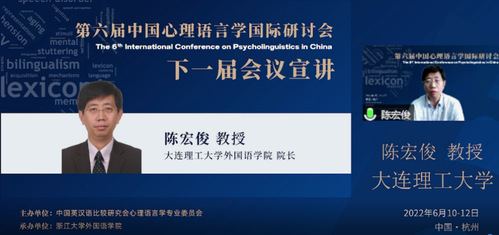
Prof. Chen Hongjun delivered his speech of promotion
It was Prof. Yan Guoli who concluded the conference. From his point of view, the conference had only a short span but held rich contents, including 5 keynote speeches, 3 interdisciplinary symposia, 7 theme fora, and 36 group reports, which showcased the progress and frontier of psycholinguistics and its related disciplines. With sufficient communication with peer scholars online and onsite, the attendees were inspired for further exploration. On behalf of the CAP, Prof Yan expressed his heartfelt thanks to Prof. Dong Yanping as Chair of the Conference, members of the Conference Committee, and expert reviewers for their contributions to organizing the Conference. He also thanked all the attendees for their efforts in promoting Chinese psycholinguistic studies onto the international arena.
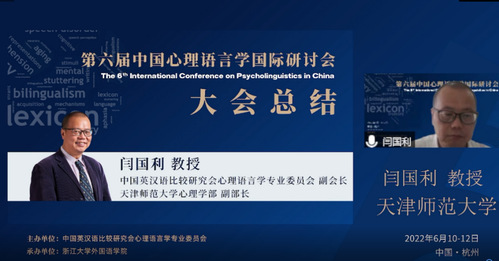
Prof. Yan Guoli concluded the Conference
The Sixth International Conference on Psycholinguistics in China was drawn to a close in an ovation.
Translated by Cai Zhengwu, Revised by Xu Xueying



